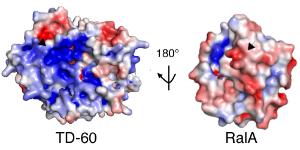News
Diana Papini's TD-60 paper in Nature Communications

Diana's paper finding that TD-60 has GEF activity for RalA in mitosis has just been published. Diana carried out much of this work while a PhD student in Bill Earnshaw's lab in Edinburgh, and completed it in Jon Higgins's lab at Newcastle. The assays that identified RalA as the target of TD-60 were done during a visit to Francis Barr's lab in Oxford.
TD-60 links RalA GTPase function to the CPC in mitosis
Diana Papini, Lars Langemeyer, Maria A. Abad, Alastair Kerr, Itaru Samejima, Patrick A. Eyers, A. Arockia Jeyaprakash, Jonathan M. G. Higgins, Francis A. Barr & William C. Earnshaw
Nature Communications (2015) 6, 7678 doi:10.1038/ncomms8678
Published 09 July 2015
TD-60 (also known as RCC2) is a highly conserved protein that structurally resembles the Ran guanine exchange factor (GEF) RCC1, but has not previously been shown to have GEF activity. TD-60 has a typical chromosomal passenger complex (CPC) distribution in mitotic cells, but associates with integrin complexes and is involved in cell motility during interphase. Here we show that TD-60 exhibits GEF activity, in vitro and in cells, for the small GTPase RalA. TD-60 or RalA depletion causes spindle abnormalities in prometaphase associated with abnormal centromeric accumulation of CPC components. TD-60 and RalA apparently work together to contribute to the regulation of kinetochore–microtubule interactions in early mitosis. Importantly, several mitotic phenotypes caused by TD-60 depletion are reverted by the expression of a GTP-locked mutant, RalA (Q72L). The demonstration that a small GTPase participates in the regulation of the CPC reveals a level of mitotic regulation not suspected in previous studies.
Last modified: Tue, 11 Aug 2015 13:36:55 BST